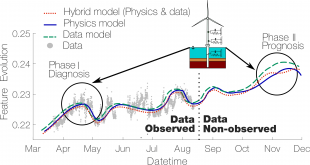In the context of long-term monitoring applications, there are numerous structural states that exhibit similar behavior but cannot be generalized with a single model (whether data- or physics-based) due to the inherent time-variant nature of structural evolution. Addressing such scenarios necessitates methodologies with adaptable models that can capture the interdependencies between Environmental and Operational Variabilities (EOV) and Damage Sensitivity Features (DSF) at various stages of structural evolution. The challenge lies in determining when distinct structures can be considered pseudo-similar, thereby sharing the same underlying physical properties to better represent the dynamics and associated EOV dependencies. Similarly, the incorporation of physics-based models, with varying levels of fidelity, adds knowledge towards understanding structural changes, which is essential for incorporating interpretable constraints on DSF evolution.
In practice, there are two main Challenges: (i) Robust extraction of DSF for continuous monitoring which are insensitive to EOVs. These DSF should be interpretable during the entire evolution of the structural performance, and they should be able to accommodate dimensionality and complexity reduction of their associated non-linear time-variant nature. (ii) And there is a need of developing measures to quantify and propagate uncertainty towards the estimation of future stages of the structure evolution.
This project is supervised by Dr David Garcia Cava (School of Engineering, University of Edinburgh). It will involve regular interaction with collaborators from academia and industry. Interested candidates may contact the supervisor for further information (david.garcia@ed.ac.uk).
Personal website: https://dgarciacava.github.io/
This advert might close once a suitable candidate is found. Please apply as soon as possible to avoid disappointment.
References
[1] García Cava, D., Avendaño-Valencia, L.D., Movsessian, A., Roberts, C., Tcherniak, D. (2022). On Explicit and Implicit Procedures to Mitigate Environmental and Operational Variabilities in Data-Driven Structural Health Monitoring. In: Cury, A., Ribeiro, D., Ubertini, F., Todd, M.D. (eds) Structural Health Monitoring Based on Data Science Techniques. Structural Integrity, vol 21. Springer, Cham
[2] Rashid, D., Giorgio-Serchi, F., Hosoya, N., and Garcia Cava, D. (2024). Physics Informed Gaussian Process for Bolt Tension Estimation. Proceedings of the 10th European Workshop on Structural Health Monitoring (EWSHM 2024), June 10-13, 2024 in Potsdam, Germany. e-Journal of Nondestructive Testing
Further Information:
The University of Edinburgh is committed to equality of opportunity for all its staff and students, and promotes a culture of inclusivity. Please see details here: https://www.ed.ac.uk/equality-diversity
Closing Date:
Principal Supervisor:
Assistant Supervisor:
TBC
Eligibility:
Minimum entry qualification - an Honours degree at 2:1 or above (or International equivalent) in a relevant science or engineering discipline, possibly supported by an MSc Degree.
Applications are particularly welcome from candidates expecting to receive a first-class degree in mechanical engineering, physics, applied mathematics or a closely related subject.
Interests on: Structural mechanics and dynamics, Stochastic modelling and uncertainty quantification, understanding environmental and operational variabilities and their impact in structures and structures for renewable energy is particularly welcome.
Further information on English language requirements for EU/Overseas applicants.
Funding:
Applications are welcomed from self-funded students, or students who are applying for scholarships from the University of Edinburgh or elsewhere.
*Competition (EPSRC) funding may be available for an exceptional candidate but please note you must be a UK student or an EU student who has pre-settled/settled status and has lived in the UK for at leats 3 years.
Informal Enquiries:
Dr David Garcia Cava: david.garcia@ed.ac.uk



